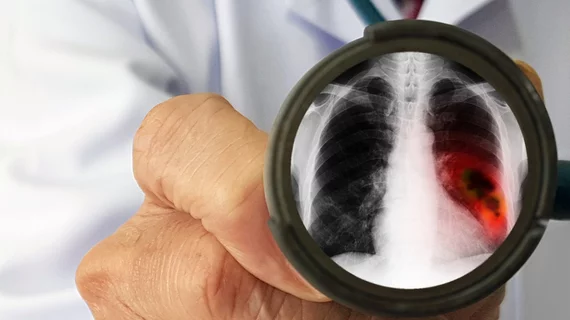For first time, large population-based study proves CT screening reduces lung cancer deaths
Research released Friday provides further proof of CT lung cancer screening’s powerful ability to reduce deaths.
The findings are based on a retrospective analysis of more than 300,000 patients with the most prevalent form of the disease, imaged between 2006-2016. Overall, lung cancer deaths decreased by 4% per year, with early stage diagnoses leaping nearly 5 percentage points, up to 31%, experts detailed in JAMA Network Open.
While the results are promising, there is still plenty of progress to be made. Less than 6% of adults who meet lung cancer screening guidelines received a scan in the prior year, according to the National Cancer Institute.
“This is the first time a large population-based study has demonstrated decreased lung cancer mortality with early detection—finding cancer in earlier stages—when tumors are smaller and more curable,” lead author Raja Flores, MD, a professor and chair of thoracic surgery at Mount Sinai Health System in New York City, said in a statement. “This study emphasizes the impact of screening followed by surgical intervention to save lives in people at high risk for lung cancer.”
To reach their conclusions, Flores and co-authors utilized data from the Surveillance, Epidemiology, and End Results registry, an authoritative cancer statistics source covering 35% of the U.S. population. Seeking data on all patients diagnosed with non-small lung cancer, they pinpointed a total population of 312,382 at a median age of 68. Alongside an increase in catching the disease early, late-stage diagnoses fell 5 percentage points, down to 66%. Both are considered “significant shifts,” Mount Sinai said in its announcement. Median survival when providers caught the disease at less severe stages was about 57 months compared to seven months in the late-stage group.
Flores and colleagues also reported a significant increase in patients with adenocarcinomas, the most common non-small lung cancer. Such cases—typically found in the organ’s outer regions, with a slower growth rate than other types—grew from 43% at the study’s start up to 59% a decade later. Increases in both early stage diagnoses and adenocarcinomas mirror findings from previous, smaller-scale lung cancer trials, the authors noted.
Factoring into the numbers, the U.S. Preventive Services Task Force in 2013 recommended screening at-risk individuals annually for lung cancer. While that likely helped bolster the numbers, the field still has a long way to go, the authors argued.
“These findings in context with prior studies seem to suggest that awareness of CT lung cancer screening is associated with an earlier detection of non-small cell lung cancer,” co-author Emanuela Taioli, MD, PhD, director of the Institute for Translational Epidemiology, said in a statement. “But unfortunately, patient adherence to the USPSTF guidance on lung cancer screening with low-dose CT remains low, at around 5 percent of those people who meet the criteria. That means that we cannot only attribute CT screening to decreased mortality, but our findings reinforce the importance of screening in the early detection, intervention and effective treatment of cancer.”
Read much more in JAMA here.

